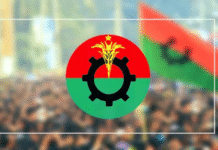Bangladesh, a nation with a history of volatile and sometimes violent politics, is entering into a critical political phase. National elections are scheduled to take place by the end of January, and the constitutionally mandated three-month interim period before elections began on October 25. The main opposition party has suggested it may boycott elections, and there are concerns that elections may not be held at all. Last week, William B. Milam discussed his recent trip to Bangladesh, and Ali Riaz offered broader context about Bangladesh’s political challenges in the weeks and months ahead.
William B. Milam
Public Policy Scholar, Woodrow Wilson Center
Professor and Chair, Department of Government and Politics, Illinois State University

Ali Riaz
Public Policy Scholar, Woodrow Wilson Center
Professor and Chair, Department of Government and Politics, Illinois State University
hearing william milam and ali riaz speak about Bangladesh at a washington dc think tank on Wednesday left little hope for the future of that benighted land, gripped as it is in the personal vendetta of its two premier women leaders, sheikh hasina of the awami league and begum khalida zia of the bangladesh national party (BNP).
the hatred between these women, one the daughter of an assassinated prime minister, sheik mujibur rahman, the other the widow of an assassinated president, ziaur rahman (no relation, as the news agencies always write), has tied bangladesh in knots for more than two decades as they alternated being prime minister. this time it is hasina’s turn at PM.
the immediate problem is the threat of a khaleda-led BNP election boycott unless a national vote that must take place by the end of January is conducted by a neutral caretaker government. sheikh hasina refuses to step down for a caretaker government, although when she was in the opposition, she supported the idea.
a remarkable facet of the Bangladesh story is the country’s development achievements. despite poverty, corruption, governing incompetence and greed, bangladesh has managed to outperform in such categories as health, population control and education both Pakistan, of which it was once a part, and neighboring india.
I’ve always believed the country’s profitable and private-sector driven garment making business (it is the world’s second largest garment exporting country, next to china) and its commitment to educating females has played a large role in whatever development gains Bangladesh has achieved. women working in garment factories that often are sweat shops have used their meager earnings for liberation of a sort not seen in any other muslim-majority state.
milam, u.s. ambassador (1990-93) to Bangladesh, (as well as to Pakistan, 1998-2001, making him the lone individual walking this earth with such a dual distinction) just back from a visit to Dhaka, laid out for the bangladesh political future three options, none of which was savory.
one was what he called a “re-set pause,” the establishment of a technocratic government with no politics, basking in the support of the secular, liberal, intelligentsia elements in the country. he shot it down himself: “totally out of the question.”
another option was what he called “an inclusive election” in which the current opposition Bangladesh national party (BNP) backed away from boycott threats and defeated the ruling awami league. milam cited what he called reliable polls conducted by protham alo, the country’s most widely circulated Bengali language daily newspaper, showing public support of the ruling awami league diminishing while that of the BNP growing.
he said that a BNP victory simply would lock Bangladesh “back to square one” in political deadlock, which, in fact, might be better than his third option, what he called a “flawed election.” realistically, he shot down this option as implausible as it would require one or both ladies to compromise, and that looks very improbable right now.
a “flawed election”, milam said, means a BNP boycott, but a vote contested by the ruling awami league, perhaps with the participation of a few marginal political parties. he called it a “one-and-a-half-party election.” that possibility looms. for example, our good friend, anwar hossaun manju, already has said his small party would participate in an election, even if the BNP boycotted it.
that option, milam said, might lead to a stable environment, perhaps, supported by the country’s business groups but leading also, not only to an authoritarian one-party state, but to what he called an eternal Awami League regime, formalized in law in some way by a puppet national assembly which would continue to degrade or destroy the institutions that normally serve democracy and completely convert them into vehicles for extraction of economic rents for the elite. he foresees a discontinuous political path away from democratic values.
milam later slightly amended his outlook when a bengali member of the audience at the Woodrow Wilson center suggested that Bangladesh already was an authoritarian state under the awami league. milan then said he should say “further” authoritarianism.
another audience member, nayem uddin ahmed, a counselor at the Bangladesh embassy, contested milam’s reference to the protham alo poll. he said a polling population of 5,000 hardly reflected the true attitudes in the country. milam disagreed.
ali riaz, a Woodrow Wilson scholar, chairman of the department of politics and governmentat Illinois state university, a former professor at Dhaka university and once a producer for the BBC in london, summed up in his remarks the dire picture bangladesh faces.
“it makes no difference,” he said, recalling the history that the BNP in power was as obstructionist as the awami league, “who is in power.”
all something to ponder. regards, az
———————————————–
Arnold Zeitlin
Visiting Professor
C/O International Office
Guangdong University of Foreign Studies
Guangzhou, China 510 420










